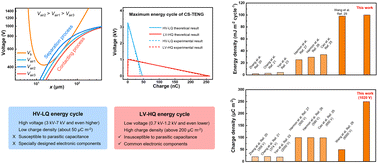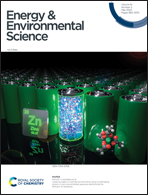Achieving high-efficiency triboelectric nanogenerators by suppressing the electrostatic breakdown effect†
Abstract
Triboelectric nanogenerators (TENGs) have attracted widespread attention owing to their potential applications in the Internet of Things era. However, developing an effective power management strategy to enable maximum energy extraction from TENGs is still a challenge. Herein, we propose a new power management strategy that maximizes the energy cycle of TENGs with high output charge characteristics and maximizes the energy extraction efficiency of power management circuits. Exploiting the dynamic charge transfer process at various loads based on simulated and experimental results, we show that the output energy of TENGs is fundamentally limited by electrostatic breakdown. By employing a half-wave circuit to suppress the electrostatic breakdown effect under load conditions and combining an optimized film capacitor and a magnetic shield inductor to reduce energy leakage, an ultrahigh energy density of 100 mJ m−2 cycle−1 and an average power density of 282.8 mW m−2 at 3 Hz were achieved. Such strategy perfectly solves the unavoidable electrostatic breakdown problem in previous power management works and greatly reduces the impact of parasitic capacitors on the output power, providing a paradigm-shift power management strategy for TENGs.



 Please wait while we load your content...
Please wait while we load your content...